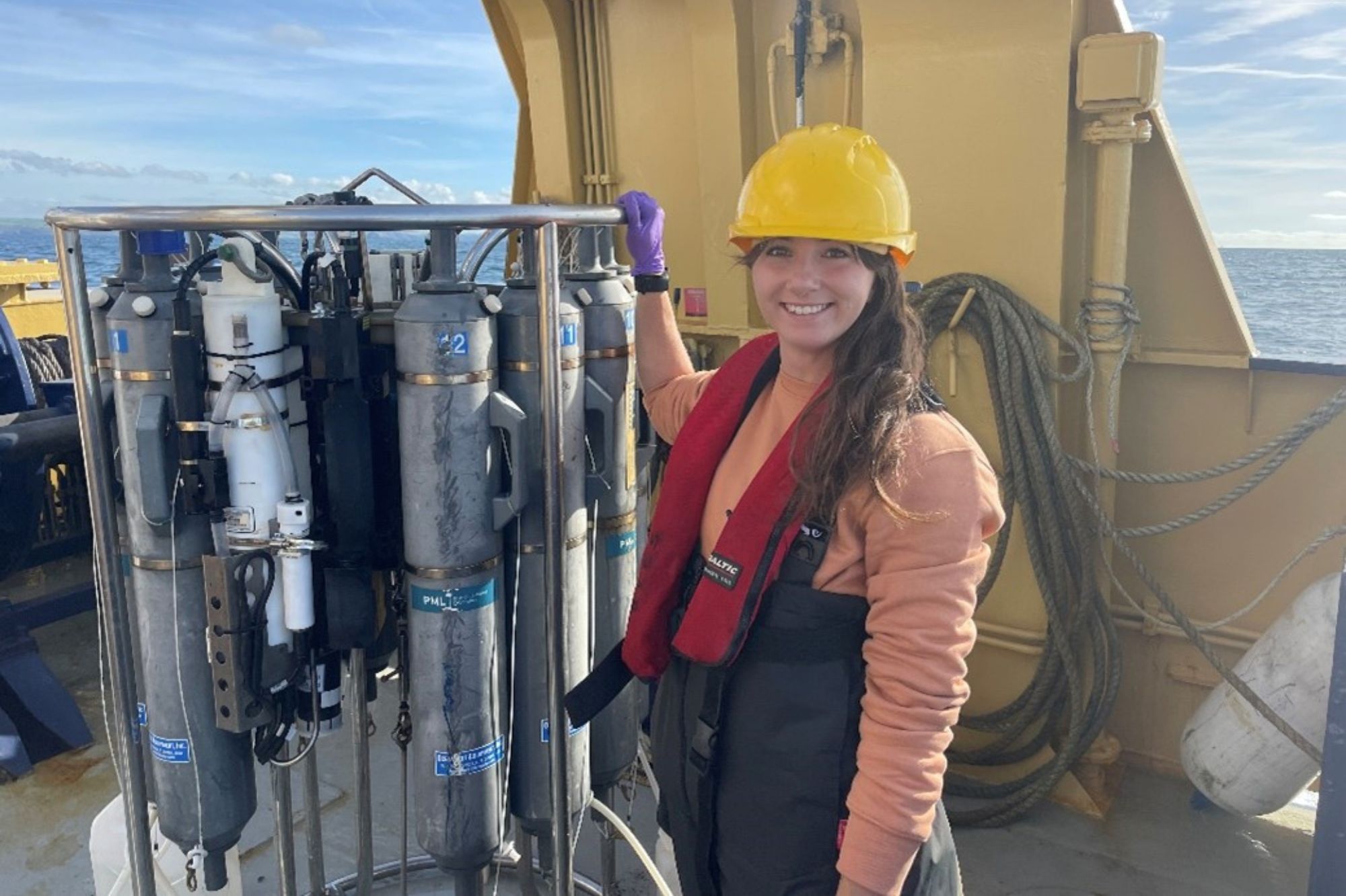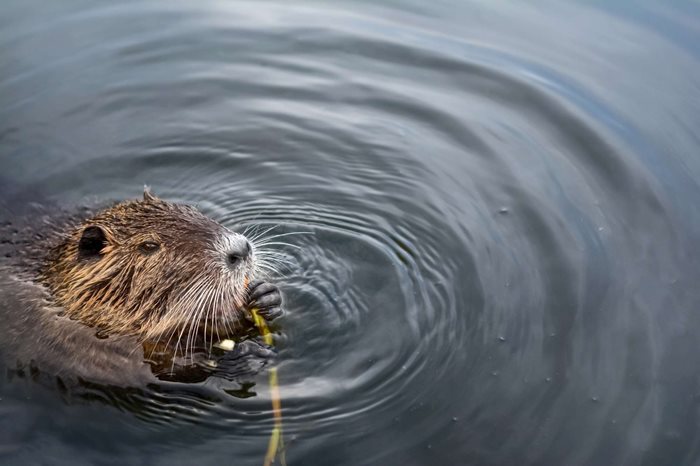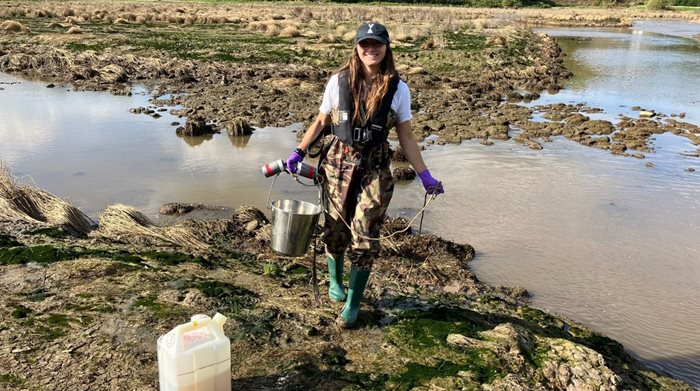Story
Staff spotlight: PhD Researcher Jasmin Dorinda
19 October 2022

Above: Jasmin on the Quest research vessel at the Western Channel Observatory L4 Station
Her PhD titled ‘Greenhouse Gases in River Catchments to Coastal Seas’, aims to address knowledge gaps in the production and transport of greenhouse gases from freshwater systems into the coastal and marine environment.
“PML offered many opportunities to grow as a researcher...”
She explains what inspired her to complete her PhD studentship with PML:
“I initially began working with Dr Andy Rees and the MBO team for my MSc thesis using data from the LOCATE project on nitrous oxide from the top of the River Tamar to the English Channel. I was venturing into new territory as an ecologist trying her hand at biogeochemistry, and I really enjoyed the new challenge.”
“During this time, I saw that PML offered many opportunities to grow as a researcher, and with this PhD studentship aligning with my career interests and aspirations across freshwater and marine systems, it was the perfect fit for me.”
Current projects
Jasmin is working on some exciting projects at PML, including AgZero+ - a £13.8 million project jointly funded by the Natural Environment Research Council (NERC) and the Biotechnology and Biological Sciences Research Council (BBSRC).
AgZero+ brings together a community of researchers and farmers to test innovative farming systems while understanding the balance between food production, reducing greenhouse gas emissions and other pollution, enhancing biodiversity and restoring soil health.
“My PhD involves collecting water samples as part of a time-series along the River Tamar to Plymouth Sound for stable isotope analysis of nitrous oxide and methane using Mass Spectroscopy, alongside measurements in carbon, nutrients and DNA. My focus is on understanding the effectiveness of nature-based solutions, such as managed coastal realignment and beaver reintroductions, in achieving impactful solutions to climate change.”

The UK has begun trialling the reintroduction of the Eurasian beaver after 400 years of absence
Funding for new autonomous technology
One project Jasmin is working on will be soon benefitting from the deployment of autonomous measurements. The environmental monitoring at the Calstock flood defence improvement scheme currently relies on the MBO team routinely visiting the site to monitor changes in the water biology and chemistry as the area develops into an established wetland habitat.
New autonomous measurements will benefit the team and the research by supplying a steady and constant stream of data that picks up changes in the environment, meaning that data collection isn’t reliant on when the team are visiting to sample.
The team are hoping to deploy a sensor in one of the wetland channels to continuously measure nitrates, oxygen, salinity and temperature.
Jasmin adds, “The autonomous technology also offers outreach potential; we’re hoping to launch a public portal where local communities and stakeholders can access the data from Calstock, offering a deeper connection to the biogeochemical changes in the wetland in real-time.”
Find out more about PML's autonomous sampling here >>

Above: Jasmin at Calstock flood defence improvement scheme
Current representation of women in Science
We asked Jasmin about the current representation of women in science, particularly in the sphere of marine biogeochemistry.
“I feel very well supported as a woman in science within MBO and am inspired by the other women in my group. There are still many barriers that exist to women in science which is why I am passionate about sharing the work I do on social media and on my website with a personal touch so that others might see a place for them within a scientific career too.”
“I believe getting more women and girls engaged with the outdoors is a powerful way to introduce them to possibilities within environmental science. It’s how I ended up here and I am forever grateful for the times I am out in my kayak on the river or swimming in the sea. This is something I am exploring through a citizen science project called ‘Moors to Shores’ which aims to connect outdoor communities with research opportunities - I’d like to invite women and girls from all backgrounds to get in touch if they’d like to know more!”
Visit Jasmin's website here >>
Living and working in Plymouth: ‘Britain’s Ocean City’
We concluded our interview with Jasmin to ask her thoughts about living, studying and working in Plymouth.
“The water community in Plymouth has made me feel so at home here. I get to immerse myself in river and coastal habitats which not only make fascinating research locations but also support positive mental health practices and inspire creative solutions to my work.
“Marine Research Plymouth - the partnership between PML, the University of Plymouth and the Marine Biological Association – also offers so much potential to support other early career researchers and learn from a huge array of expertise.”
‘If you’re a student deciding on where to complete your placement, PML is a great choice. There is so much to learn here and, even more importantly, a welcoming community of researchers always happy to help. Whatever your research interests are, completing a placement is a rewarding and motivating way to help direct your next steps.”
“PML strives to lead in Equality, Diversity and Inclusivity, with an EDI policy and an EDI committee meeting monthly to continuously strengthen a truly inclusive environment for all staff and students. PML also has a very active Sports and Social Club which encourages friendships within the workplace. I’ve found this reflects the great attitude to supporting staff and students through a healthy work-life balance.”
.jpg)
--
If you would like to find out more about working and studying at Plymouth Marine Laboratory, please visit the webpages below:
Career opportunities >>
PhD studentships >>